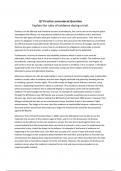Q7 Practice assessment Question
Explain the rules of evidence during a trial.
Evidence can be effected and therefore become unsatisfactory, this can be due to the way the police
investigated the offence, the way physical evidence was collected or problems with a testimony.
There are two types of bodies who give evidence in court, one is the prosecution. Their role is to
prove it’s allegation in trial and show that it is correct, they also prove the defendant has committed
the offence beyond reasonable doubt. Moreover, they attempt to convince the judges and the juries.
Defence also gives evidence in court, they try to disprove the allegations and provide a counter
argument to the prosecution, as well as supply a reasonable doubt for the defendant.
Furthermore, in terms of relevance and reliability, evidence which is used in court must be
admissible, which means that it must be relevant to the case, as well as credible. The evidence must
be authentic, meaning a document presented in evidence must be a genuine fact, not forgery. As
well as this it must be accurate, meaning it must be correct in all details, if it is an expert, it should be
supported by the rest of the scientific community. Lastly, are there matters which the prosecution
attempts to prove and defendants disprove.
Moreover, evidence can also be inadmissible in court, meaning it cannot be legally used. Inadmissible
evidence usually refers to evidence that has been illegally obtained and gained by breaking the law
or violating a person’s human rights. This could include an illegal search without a warrant, using
torture or degrading treatment to obtain a confession. This would be a breach of Section 78, PACE,
where prosecution evidence that is obtained illegally or improperly, which will be inadmissible
evidence if it will endanger the fairness of a trial. An example of inadmissible evidence is shown
through the Bill Roache case. Bill Roache was accused of sexually assaulting several women around
40 years ago, there was evidence stating that Bill Roache had slept with 1000 women. However, Piers
Morgan introduced this idea on an entertainment show, therefore it was in the context of light
entertainment. The Judge in the case ruled this evidence as inadmissible because a reference to a
thousand women would have the tendency to linger the mind and this would be too prejudicial
against Bill Roache.
Moreover, The Criminal Procedure Rules in 2000, states the defendant must be able to see the
materials that are part of the evidence against them, and it is on the prosecution to disclose
evidence to the defence so they can prepare to answer the case that is built against them. Any
unused material that the prosecution does not intend to present in court, even if it undermines the
prosecution’s case, should be shown to the defence. An example of disclosure of evidence not
happening is the Liam Allan case. Liam Allan was accused of 12 count of rape and sexual assault,
however messages on the compliants phone between her and Allan, proving Allan as innocent was
not disclosed, this displays how important disclosure rules are as Liam Allan described how this false
accusation had a tremendous impact on his life and family. However, the exception of disclosure of
evidence occurs when the evidence is deemed to be a risk and cause serious prejudice on an
important public interest.




